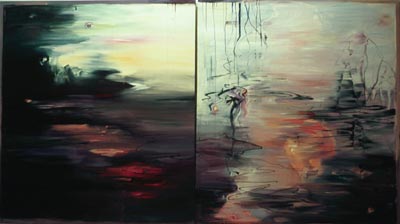| |
 |
||||
| |
|
||||
| |
|
|
|||
For Berenice D’Vorzon, beauty has always exuded a terrifying essence. Like the 19th century romantic painters and writers she admires, the equation, as I believe her work attests, she sees it, is a simple one. Beauty is truth, and as such it is elusive, intangible and completely invisible. It cannot and does not exist in the world of material objects, be they the creations of gifted minds or the physical expressions of the earth beneath our feet, but exclusively and emphatically in our experience of these things. This being the case, she sees all art as a process, a continuous disciplined activity terminated only by death, to invite and provoke the experience of beauty. The products or art objects function not as a goal or fulfillment of this process, but rather as documentation of the artist’s personal, ritual involvement and pursuit of a holy communion with the ferocious presence of truth. The idea of the creative activity as a transcendental experience is one of the few aspects of D’Vorzon’s work that still links her to the New York School of Abstract Expressionism from which she emerged. She was frequently told she “painted like a man” by the likes of Pollock and DE Kooning, whose stylistic influences on her work are still pronounced. continued
>>> |